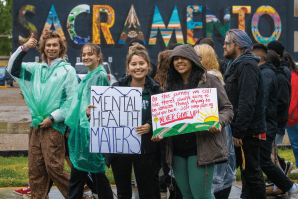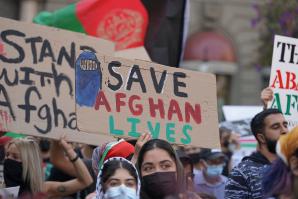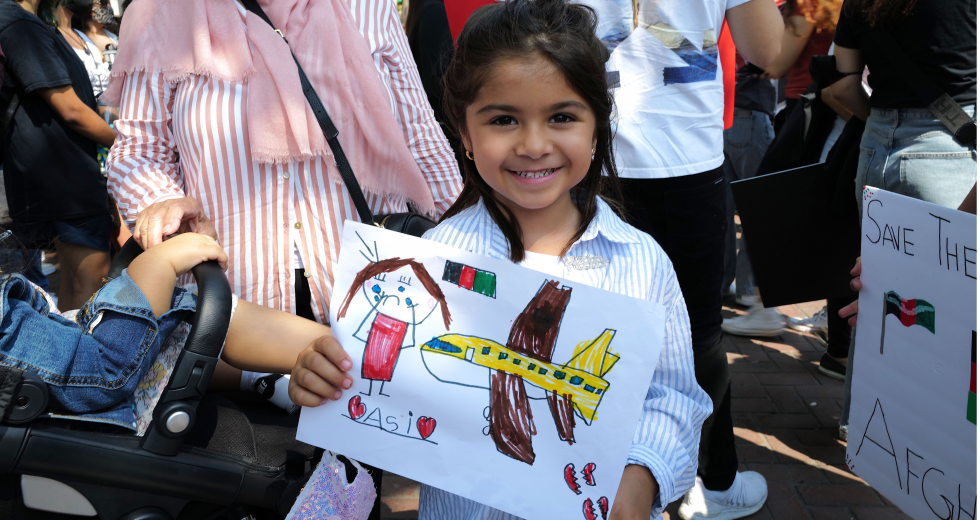At just 2 years old, Gulshan Yusufzai became an Afghan refugee due to the Soviet Union’s 1979 invasion of Afghanistan. After years of searching, the then-9 year old found a home in Sacramento with her family, where she has since dedicated her career to aiding the many other children enduring a life similar to her own beginning. “War has a tendency to take the humanity out of you,” she says.
As the executive director of Sacramento’s Muslim American Society — Social Services Foundation, an organization focused on refugee mental health, Yusufzai has been helping Afghan children and families settle in California’s capital since long before America’s full troop withdrawal from Afghanistan in August 2021. Now, one of her organization’s primary goals is to help the latest influx of refugees — especially children and young adults — adapt to their new environment while taking care of their mental and emotional well-being.
Sacramento children can call or text the MAS-SSF’s Muslim Youth Hopeline for support. Dial 855-95-AMALA to receive peer support five nights a week.
With the subsequent rise of the Taliban came the arrival of nearly 80,000 Afghans to the U.S., who will be forced to leave America this August if the currently stalled Afghan Adjustment Act does not pass as legislation. If passed, the bill, S.4787, would provide a path to permanent status for the Afghans who arrived following the 2021 fall of Kabul. “The biggest thing holding up the Afghan Adjustment Act is that nobody wants to own it. The Democrats don’t want to own it because it’s about Afghanistan, and Afghanistan and the withdrawal is something they’d rather forget,” says Elliot Ackerman, an author and former marine who served in Afghanistan. “Republicans don’t want to own it because it’s an immigration issue.”
Thousands of those refugees have been resettled in the Capital Region, already home to about 20,000 people of Afghan descent. Most stateside refugees are women and children; nearly 50 percent of those evacuated were under 18. Refugee youth often bring traumatic lived experiences, known as adverse childhood experiences, raising the demand for U.S.-based mental health services. A network of support groups has formed to provide culturally sensitive care and catch those falling through the cracks.
Mental health can still be taboo
Addressing mental health can be sensitive for anyone, but cultural sensitivity is especially important when working with refugee youth. Afghan culture is characterized by a collective perspective that looks down upon those who leave or seek support outside of the family, resulting in kids not seeking services once in Sacramento, Yusufzai says. She adds that the individualistic culture of the U.S. is confusing for Afghan youth to navigate coming from one focused on the family unit.
Kendra Kirane, a New York-based program manager for the International Rescue Committee, says that IRC has found that the phrase “overall wellness” comes with more success than “mental health.” “It can be a little bit intimidating to come out and say, ‘I need mental health support.’ There might be concerns — what would happen to me as a refugee if I say I have these needs,” Kirane says.
The Sacramento chapter of the 90-year-old international nonprofit, which works with governments to resettle refugees, has an expanding wellness team and recently opened new “safe spaces” for women and children. In these locations, refugees enduring domestic violence and other hardships can receive psychosocial and wellness services. This effort is funded by the Public Health Institute under the PHI project SEHAT Initiative, a program focused on improving the humanitarian and health care needs of refugees. (The name derives from the Arabic word for health.)
SI provides Afghan refugee-focused education sessions on topics including child trauma, navigating U.S. health systems and refugee mental health. SI’s program director is Dr. Mohammed Sediq Hazratzai, a visiting professor at UC Davis and former Afghan refugee. According to his research, Sacramento is home to one out of every nine U.S.-based Afghans. Mental health support is especially difficult for young refugees, he says: “Children’s brains are not fully developed, and they are not as resilient as their adults and they cannot process what is going on.”
Sediq is also involved in the The Ulysses Project at UC Davis. Focused on the immediate needs of refugees during the three-month to three-year post-resettlement period, The Ulysses Project aims to reduce the incidence of post-traumatic stress disorder while increasing the social integration of refugees. “What we over-medicalized as a psychiatric problem is actually a social problem,” says Dr. Patrick Koga, director of The Ulysses Project and a former Romanian refugee.
The role of school-based care
Aside from sleeping, children spend the largest share of their time at school, so for a refugee uprooted into a new country and in need of resources, the access and care provided at school is crucial.
“What mental health means for them can mean something really different for us in the West,” says Patrick Schirmer, a local school-based mental health clinician working with Afghan youth at Howe Avenue Elementary School in the San Juan Unified School District.
Schirmer says students at his school have no way to identify themselves as Afghans on most government forms, instead having to choose between Asian or white. That results in sparse documentation of how many Afghans are at his school. Schirmer says this impedes the quality, quantity and tracking of support for these students.
He says that the biggest issue among the Afghan students he sees is trauma, such as the trauma of having family and friends still stuck in Taliban-controlled Afghanistan. He recalls helping a non-English-speaking Afghan mother in Sacramento set up a GoFundMe to help her family escape her then-actively collapsing country. Schirmer’s message to his students’ caretakers is that his presence as a social worker is temporary in their child’s life, while theirs is not.
While Howe Avenue Elementary currently has just one Afghan employee, the potential passing of the Afghan Adjustment Act could mean more Sacramento students see representation in their teachers and staff as more Afghan translators and educators would be allowed to settle in the capital.
When Afghan youth in Sacramento enroll in local colleges, they may meet mentors with similar lived experiences who are working within school systems to further equitable support. One of these is Jasmine Ali, the Muslim daughter of a Fiji-Indian immigrant. Ali is a licensed clinical social worker and professor of social work at Sacramento State as well as a trauma and intervention coordinator at Opening Doors, a Sacramento-based refugee aid organization. She sees roughly 20 cases per week through Opening Doors, nearly all of whom are Afghan refugees.
Although they worked with Sacramento-based Afghan refugees before the fall of Kabul, Opening Doors’ services, such as legal resources and school intervention care, became in higher demand following August 2021, its busiest year in three decades. In 2021, 53 refugees graduated from Opening Doors’ Afghan Womens’ Wellness Program, a 12-week program supporting connectedness, satisfaction and mental wellness.
Ali recalls harrowing stories from her clients, who described hiding from the Taliban in basements and closets to avoid kidnapping, but is optimistic about their resilience. “The Afghan community, specifically, is exceedingly well equipped to handle trauma,” she says.
–
Stay up to date on business in the Capital Region: Subscribe to the Comstock’s newsletter today.
Recommended For You

A Push for School-Based Mental Health
Ratcheted up by the pandemic, students’ mental health has become an important focus in schools
Schools and universities in the Capital Region have taken an array of approaches to assure mental health is one of the many pillars a student’s education addresses.

Shelter From the Storm
Businesses, nonprofits and faith-based organizations in the Capital Region offer refugees hope
Immigrants restarting their lives are finding their way through job training, community support and spiritual connection.

The New Fusion Food
Young restaurateurs in the Capital Region are rewriting the definition of authenticity
Capital Region restaurant owners with mixed backgrounds are
channeling their points of view into creative dishes.

Neighborhood Favorite: Aria Afghan Restaurant
A former translator brings Central Asian flavors to North Highlands
Aria Afghan Restaurant in North Highlands serves a cuisine that
hails from the crossroads of South and Central Asia,
including one dish that takes over 10 hours to make.



